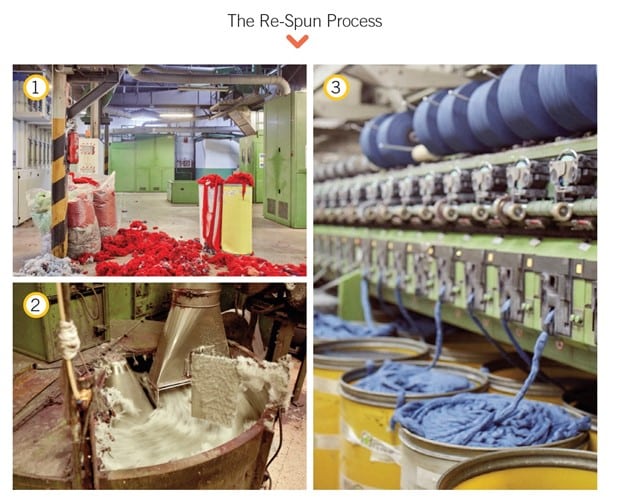There’s nothing like the feel of a worn-in, old t-shirt. The fibers have relaxed over time, making it soft to the touch, and, of course, there’s the immediate feeling of comfort every time you slip that trusty tee over your head. Mike Natenshon, CEO of San Francisco, California-based supplier Marine Layer, treasured his favorite t-shirt, so much so, that when Kelly, his then-girlfriend and now wife, threw it away, he decided to launch a business based on recreating the same look and feel of his retired tee.
“The day after my girlfriend threw away my favorite shirt, I started working on Marine Layer,” says Natenshon. “To be fair, she wasn’t crazy or anything. This one really was on its last legs—the shirt, not Kelly. I was also probably a little crazy to quit my job and spend the next year perfecting a custom fabric, but here we are.”
In his effort to develop the ultra-soft fabric for his tees, Natenshon brought onboard his best friend Adam Lynch, now chief operating officer, and together they developed their signature fabric and officially launched the company in 2010. With sustainability top of mind, the company uses MicroModal in the majority of its tees, a substance made from recycled beechwood. “The pulp production is self-sufficient, which makes our tees sustainable, eco-friendly and soft,” says Natenshon. Today, the company—which has since created more than 100 custom fabric combinations and counting—creates its fabrics based on four pillars of low-impact, sustainable materials: recycled plastics; upcycled cotton, made from breaking down donated tees; Tencel, made from the wood pulp of eucalyptus trees; and modal, a fine cellulosic fiber from beechwood trees. “We’ve built a brand around absurdly soft shirts that are perfect for a seven-day-weekend kind of lifestyle,” says Natenshon.
To boot, Marine Layer offers PMS color-matching abilities, and can produce seven different t-shirt styles in any color of the client’s choosing. “We’re like magicians,” says Natenshon. “You can pick a color—any color—and we’ll make it happen. Plus, we’ll make it happen faster than anyone else.” The minimum order is 100 units per color, which can be combined with different styles using the same fabric, and lead time is just three-to-five business days.
Once the tees were made—80 percent of Marine Layer’s custom line is produced in California and 20 percent is made overseas—Natenshon and Lynch realized they needed something to help transport them, and what better than a ’69 Volkswagen Bus? “It’s only broken down like 27 times, so we’re feeling pretty good about the investment,” says Natenshon. The pair took the Neptune blue bus and gave it a total refresh, adding a couch, keg and—of course—shirts, and their t-shirt biz became mobile. From there, they promoted their tees up and down the West Coast, gaining attention on social media by sharing photos of their travels along the way. The business has since grown exponentially from its early days, but the bus hasn’t retired. Natenshon and Lynch still drive their VW bus across San Francisco’s Golden Gate Bridge every day into their company’s headquarters.
Since Marine Layer was founded 10 years ago, the company has collected 168,232 tees; an effort made possible through its Re-Spun program. Re-Spun, launched nine years ago and outlined more in detail below, is the company’s “revolutionary recycling program” that “changed everything” for the business. Looking to become more integrated in the sustainability movement, they realized the tremendous waste that accrues in the apparel industry and decided to become “part of the solution, not the problem,” says Natenshon. During Re-Spun’s first week, the company collected 5,000 shirts—and to date, Marine Layer has helped divert more than 30,000 pounds of textile waste from landfills and saved more than 270 million liters of water, as the tees are created using a process that is entirely waterless, void of added dyes and free of new materials. In 2019, 75 percent of the company’s custom fabrics were made using sustainable materials, and this year, Marine Layer pledges to raise the number to 81 percent.
Along with sustainable materials, Marine Layer wanted to explore another way of giving back to the community, and so the Giving Tee program was born. “We partner with charities that are close to our hearts to make limited-edition, custom-designed, absurdly soft graphic tees,” says Natenshon. With the sale of each tee, the company donates $15 to their partner organization. The company’s most recent Giving Tee program was created for Protect Our Winters, an organization founded by professional snowboarder Jeremy Jones to encourage the outdoor sports community to fight against climate change, and in 2017, the program helped raise more than $75,000 for the National Park Foundation and more than $32,000 for the Trevor Project. Marine Layer has plans for a new Giving Tee program to roll out for Earth Day on April 22.
In addition to its presence in the promotional products and custom apparel industries, the company currently has 47 brick-and-mortar stores across the country, along with three retro-themed Airbnbs in Portland, Chicago and New Orleans. The latter wasn’t planned, but came about after Natenshon and Lynch kept traveling back and forth between the Portland location and their San Francisco headquarters, and needed a place to stay. Eventually, Natenshon suggested trying their luck with an Airbnb, and giving it “that real retro vibe that people love our stores for,” he says. Soon enough, the Portland loft, which opened in 2015, was booked for 300 days out of the year, and they look toward opening more locations. The Portland Airbnb is currently closed for renovations, but the company is looking to the future to open additional locations in Washington, D.C., New York and Austin.
But despite the company’s onward expansion, Marine Layer will continue to remain dedicated to its core purpose of recreating everybody’s favorite tee, using a production method that’s sustainable and eco-conscious, and constantly remaining on the lookout for new ways to positively impact the community with its line of apparel.




–––––––––––––––––––––––––––––––––––––––––––––––––––––––––––
About Marine Layer
Founding date: 2010
Principals: Mike Nathenshon, CEO, and Adam Lynch, chief operating officer
Number of orders filled per month: Hundreds of orders are fulfilled each month through the company’s custom channel
Most popular items: Signature Crewneck Tee, Afternoon Hoodie and Reversible Quilted Corbet
–––––––––––––––––––––––––––––––––––––––––––––––––––––––––––
Danielle Renda is associate editor of PPB.


